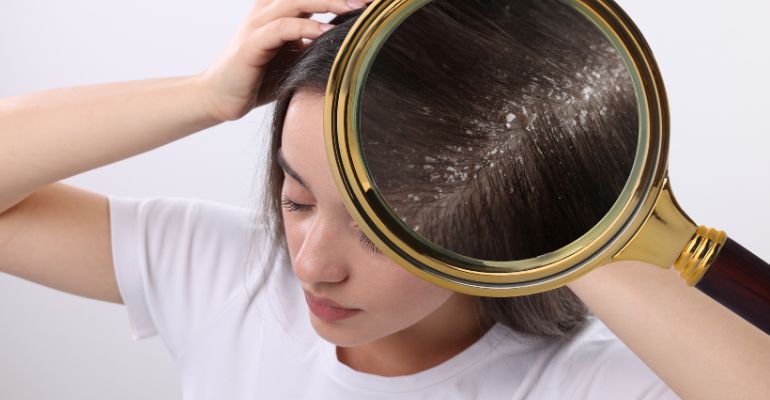Dandruff - Causes and Treatments

Dandruff - Causes and Treatments
Dandruff is one of the most common scalp conditions, affecting millions of people worldwide. While it may seem like just a cosmetic issue, dandruff can be a source of discomfort and embarrassment. Well, the good news is that dandruff is treatable, and with the right approach, you can manage it effectively.
In this blog, we will see the causes of dandruff and the most effective dandruff treatments to help you regain a healthy, flake-free scalp.
What Is Dandruff?
Dandruff refers to the shedding of dead skin cells from the scalp, which results in visible flakes. It is often accompanied by itching or irritation, and while it is not a serious health concern, it can be frustrating and sometimes difficult to manage. The appearance of dandruff can range from mild flaking to larger, more noticeable flakes, and can occur in people of all ages.
Causes of Dandruff
Dandruff can be caused by several factors, often in combination with one another. Understanding the root causes can help you choose the right dandruff treatment.
Dry Skin
One of the most common causes of dandruff is dry skin, especially during colder months when the air is dry. Dry skin causes flakes to form on the scalp, which can be itchy and irritating. These flakes are usually smaller and less oily than those caused by other factors.
Seborrheic Dermatitis
A more serious kind of dandruff is called seborrheic dermatitis. This long-term ailment results in redness, irritation, and oily, yellowish scales on the scalp. The overgrowth of a yeast-like fungus called Malassezia, which naturally occurs on the scalp, is thought to be the cause of seborrheic dermatitis. Dandruff may result from this fungus's irritation when it gets out of control.
Fungal Infections
The signs of fungal infections, including ringworm, often resemble dandruff. These infections may result in skin cell loss, redness, and itching. Antifungal drugs are often used to treat them.
Sensitivity to Hair Products
Some people are sensitive to certain ingredients in shampoos, conditioners, or hair styling products. These sensitivities can cause irritation, itching, and flaking on the scalp. Harsh chemicals, fragrances, and preservatives in hair products can strip the scalp of natural oils, leading to dryness and dandruff.
Not Shampooing Enough
If you don’t wash your hair frequently enough, oils and dead skin cells can build up on the scalp. This can create an environment in which yeast and other microorganisms can thrive, leading to dandruff.
Other Factors
Dandruff can also be caused by stress, hormonal fluctuations, and specific medical diseases (such as immune system abnormalities or Parkinson's disease). A poor diet, sleep deprivation, and other lifestyle choices can also contribute to flare-ups of dandruff.
Effective Dandruff Treatments
Now that we know what causes dandruff, let’s explore some of the most effective dandruff treatments to help manage and reduce flakes.
Medicated Shampoos
The initial line of treatment for dandruff is frequently medicated shampoos. The active ingredients in these shampoos work against the underlying causes of dandruff, which include irritation, fungus, and excess oil. Among the most popular ingredients to search for are:
- Zinc Pyrithione: This ingredient helps reduce the growth of the Malassezia fungus.
- Ketoconazole: Another antifungal agent that helps control yeast overgrowth.
- Selenium Sulfide: Reduces scalp inflammation and slows down the turnover of skin cells.
- Coal Tar: Helps reduce flaking and is often recommended for seborrheic dermatitis.
- Salicylic Acid: Helps remove dead skin cells and exfoliate the scalp.
Using medicated shampoos requires careful adherence to the directions. Before washing, several of these shampoos require a few minutes to sit on the scalp.
Natural Treatments
If you prefer a more natural approach, there are several home remedies that may help alleviate dandruff symptoms. These include:
- Tea Tree Oil: Tea tree oil is known for its antifungal qualities, which can help lessen dandruff brought on by fungus infections. Massage a few drops of diluted tea tree oil into your scalp using a carrier oil, like coconut or olive oil. After 20 to 30 minutes, leave it on and then rinse it off.
- Apple Cider Vinegar: The acidity of apple cider vinegar can help balance the scalp’s pH and reduce the growth of yeast. Mix equal parts apple cider vinegar and water, and use it as a final rinse after shampooing.
- Coconut Oil: Coconut oil can help soothe dry, irritated scalp skin and reduce dandruff as it contains moisturizing and antimicrobial properties that can help. Massage it into your scalp and leave it on for an hour before washing it out.
Proper Scalp Care
Good scalp hygiene is key to preventing and managing dandruff. Wash your hair regularly with a mild shampoo, especially if you have oily hair. If you have dry skin, try using a moisturizing conditioner to keep your scalp hydrated. Avoid using harsh hair products that may cause irritation, and limit the use of heat styling tools that can dry out your scalp.
Diet and Lifestyle Changes
A healthy diet plays an effective role in scalp health. Foods rich in vitamins B, D, and E, as well as omega-3 fatty acids, can help promote a healthy scalp. Drinking plenty of water and managing stress can also reduce the frequency of dandruff flare-ups.
Final Thoughts
Dandruff may be a common and often embarrassing problem, but with the right treatment, it is manageable. Whether you choose medicated shampoos, natural remedies, or lifestyle changes, there are several ways to treat and prevent dandruff. If your dandruff persists despite these treatments, it may be helpful to consult with a dermatologist to rule out other conditions like seborrheic dermatitis or fungal infections. By understanding the causes of dandruff and taking the right steps toward treatment, you can achieve a healthier scalp and enjoy a flake-free head of hair.
